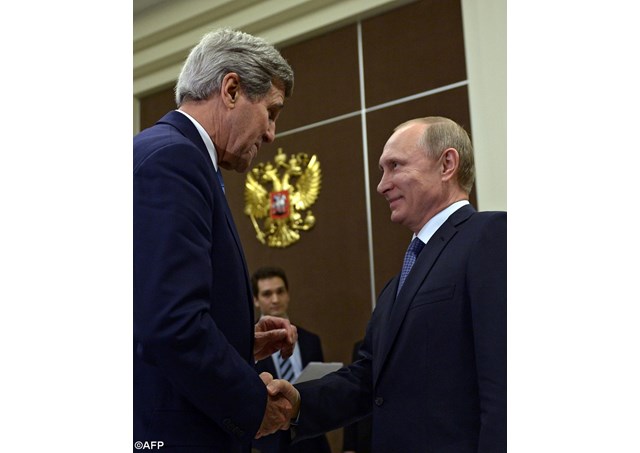
US, Russia Seek End To Crisis

(Vatican Radio) The United States and Russia have tried to end their worst crisis since the collapse of the Soviet Union, but their most extensive, high-level meetings in years on Ukraine and Syria did not yet point to a breakthrough. U.S. Secretary of State John Kerry held eight hours of talks with President Vladimir Putin and his foreign minister in the Black Sea resort of Sochi.
Listen to the report by Stefan Bos:
Kerry met President Putin Tuesday after the Kremlin agreed to the meeting at the last moment. Behind the smiles and handshakes, tensions remain over Russia's role in Ukraine and Syria.
Washington has also expressed concerns over Russia's treatment of people the government doesn't like, including dissidents, and the granting of asylum to former U.S. National Security Agency contractor Edward Snowden after he revealed an extensive spying program.
The lengthy meeting with President Putin followed hours of talks between Kerry and Russia's Foreign Minister Sergey Lavrov on issues that included ongoing clashes between pro-Russian separatists and government forces in eastern Ukraine.
Russian Support?
Western leaders have accused Russia of supporting the separatists with weapons and troops, but Moscow denies the charges.
Speaking to reporters, Kerry urged Moscow to more actively support a ceasefire agreement signed in Minsk, Belarus, if it wants Western sanctions to be removed.
"I reiterated America's view that the Minsk agreements are absolutely in our judgement by far the best path, the principle path, to peace. And those agreements must be fully implemented, the sooner the better," he said.
"If and when Minsk is fully implemented, it is clear: the US and EU sanctions can begin to be rolled back,” Kerry promised.
Kiev Warned
However, in surprise remarks, he also warned Ukraine's President Petro Poroshenko not to seek the "liberation" of the Donetsk Airport from rebels in eastern Ukraine which he suggested in a recent speech.
If indeed, President Poroshenko is advocating an engagement in a forcible effort at this time, we would strongly urge him to think twice not to engage in that kind of activity," Kerry said.
"That would put [the] Minsk [agreement] in serious jeopardy and we would be very, very concerned of the consequences of what that kind of action would be.”
Some issues, such as Russia's annexation last year of Ukraine's Crimea region, weren't publicly spoken of at all.
Wider Cooperation
Besides Ukraine, Kerry made clear that he and his Russian counterpart agreed to work harder on implementing a 2012 U.S.-Russian strategy for a transitional government in Syria that has been a complete failure to date.
"From the Geneva communique to the removal of Syria’s chemical weapons, I would emphasize that we have seen what happens when Russia and the United States work together," Kerry added.
"It is clearly possible to make real progress and make important things happen."
He also said that this unity played a key role in international negotiations with Iran on its nuclear program.
This was Kerry's first visit to Russia since the Ukraine crisis erupted and it coincided with the 70th anniversary of the allied defeat of Nazi Germany and Kerry laid a wreath at a World War Two memorial in Sochi. Russian officials and analysts suggested his trip may have been a first step towards normalizing relations.
| All the contents on this site are copyrighted ©. |


